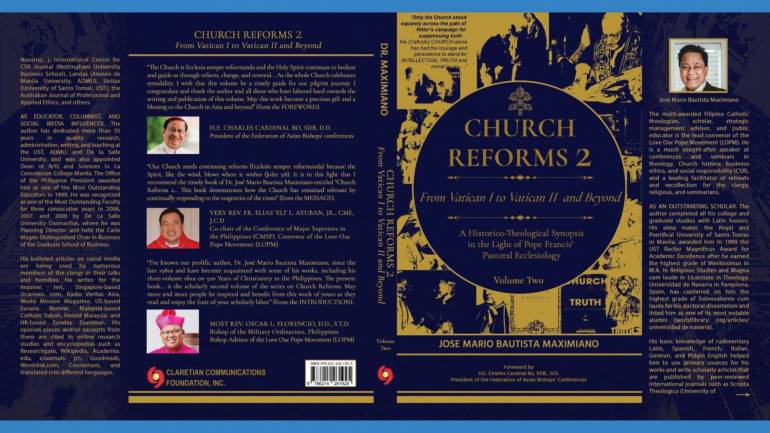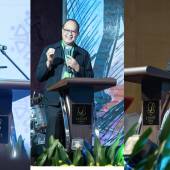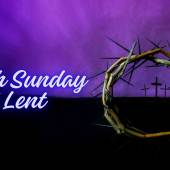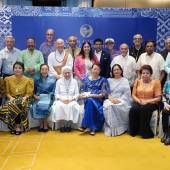Cardinal Bo Lauds new book on Church Reforms

Cardinal Charles Maung Bo, Archbishop of Myanmar and President of the Federation of Asian Bishops’ Conferences (FABC), extolls the newly released second volume of a book series entitled Church Reforms 2, by Dr. Jose Mario Bautista Maximiano, twice winner of the Cardinal Sin Catholic Book Awards.
In his foreword, Cardinal Bo cites the book’s “fresh insights into the process of reform and renewal in the Church,” which he considers to be “of great interest and benefit for the Church and all peoples of Asia.”
Cardinal Bo couldn’t have put it more succinctly, as this second volume took pains to explain the challenges the Church faced through one of the most controversial periods of its existence in the modern era. Starting off with the pontificates of the succession of Pope Pius-es, Dr. Maximiano explains how the much-maligned popes did their duties as champions of positive transformation in the Church as they silently bore the calumnies of the unforgiving media of the times.
Most significantly, the book entitled Church Reforms 2 dwelt rather extensively on the various aspects of the Second Vatican Council, which was recognized as a Pentecostal event and which, according to Pope Benedict XVI, was an ecumenical council that is “not only meaningful but also necessary.” The treatise on the debates on the dogmatic constitution of the Church, Lumen Gentium, truly deserves the most attention, as this document impacted what the Church should be: a Church always in need of purification, semper purificanda.
Theologian Fr. Benigno Beltran, in his lecture, “The Holy Spirit in the Teaching of the Church,” delivered at a conference series on the Holy Spirit conducted by the Divine Word Seminary in 1982, said that it is “unfortunate that while the Church constantly proclaims that the Holy Spirit is constitutive of her very being and remains her very soul, the role of the Spirit in Christian life has either been minimized or completely forgotten.” (“Studies in Philosophy and Theology," Diwa Vol. VI, No. 2, March 1982).
Indeed, the Church's acts and pronouncements in modern times are difficult to comprehend and appreciate, just as the role of the Holy Spirit in the Church requires much prayer and discernment. Nonetheless, “the Church, which is the Bride of Christ,” says Cardinal Bo, “is always guided by the Holy Spirit, who is the principal agent of mission.”
This explains the emphasis Cardinal Bo placed in his foreword on the issues concerning Vatican II, citing Pope Francis’ call for synodality as a “continuance of Vatican II and its calls for reform and renewal.”
However, many, especially the ultra-conservatives who have been vocal in their criticisms of the current Papal dispensation, may perceive this call for reform and renewal as undermining the Church's infallibility in terms of its teaching ministry.
However, we must interpret this direction as merely acknowledging the Church's human nature and, crucially, its ability to adapt and evolve, particularly considering the significant shifts in technology and society over the past 50 years, which have enabled an almost uncontrollable and even reckless flow of information with remarkable speed and apparent urgency.
For this reason, Cardinal Bo was effusive about the emergence of vital publications like this.. In fact, it is in this light that Cardinal Bo might have been alluding to the author Maximiano as one of the “shepherds after the heart of Christ… to continue the ministry entrusted to Peter to ‘feed my lambs, feed my sheep.”
This second volume, Church Reforms 2, does address the need of Christ’s flock for “medicinal food,” not merely to nourish the people but to help cure the wounds that may have somehow percolated in their hearts and minds.
If anything, the book is a rich source of information on Pastoral Ecclesiology, on the Church’s history of growth and development in much clearer and more precise terms. It certainly can be expected to fulfil Cardinal Bo’s prayer that the book becomes a “precious gift and a blessing to the Church in Asia and beyond.”
*The writer is a former Editor at Logos Publications, the publishing arm of the Society of the Divine Word.
Radio Veritas Asia (RVA), a media platform of the Catholic Church, aims to share Christ. RVA started in 1969 as a continental Catholic radio station to serve Asian countries in their respective local language, thus earning the tag “the Voice of Asian Christianity.” Responding to the emerging context, RVA embraced media platforms to connect with the global Asian audience via its 21 language websites and various social media platforms.














